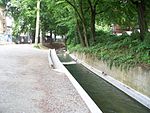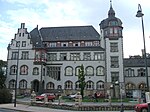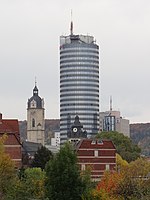Jena (German pronunciation: [ˈjeːna] ) is a city in Germany and the second largest city in Thuringia. Together with the nearby cities of Erfurt and Weimar, it forms the central metropolitan area of Thuringia with approximately 500,000 inhabitants, while the city itself has a population of about 110,000. Jena is a centre of education and research; the university (now Friedrich Schiller University) was founded in 1558 and had 18,000 students in 2017 and the Ernst-Abbe-Fachhochschule Jena counts another 5,000 students. Furthermore, there are many institutes of the leading German research societies.
Jena was first mentioned in 1182 and stayed a small town until the 19th century, when industry developed. For most of the 20th century, Jena was a world centre of the optical industry around companies such as Carl Zeiss, Schott and Jenoptik (since 1990). As one of only a few medium-sized cities in Germany, it has some high-rise buildings in the city centre, such as the JenTower. These also have their origin in the former Carl Zeiss factory.
Between 1790 and 1850, Jena was a focal point of the German Vormärz as well as of the student liberal and unification movement and German Romanticism. Notable persons of this period in Jena were Friedrich Schiller, Alexander von Humboldt, Johann Gottlieb Fichte, Georg Wilhelm Friedrich Hegel, Novalis, and August Wilhelm Schlegel.
Jena's economy is largely built upon its high-technology infrastructure and research. The precision optical instruments industry is its leading branch to date, although software engineering, other digital businesses, and biotechnology are of growing importance. Furthermore, Jena is also a service hub for its regional environs.
Jena lies in a hilly landscape in the east of Thuringia, within the wide valley of the Saale river. Due to its rocky landscape, varied substrate and mixed forests, Jena is known in Germany for the wide variety of wild orchids which can be found within walking distance of the town. Local nature reserves are maintained by volunteers and NABU.












